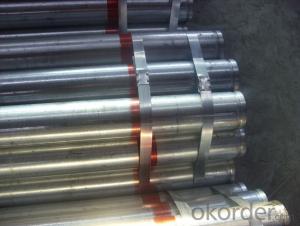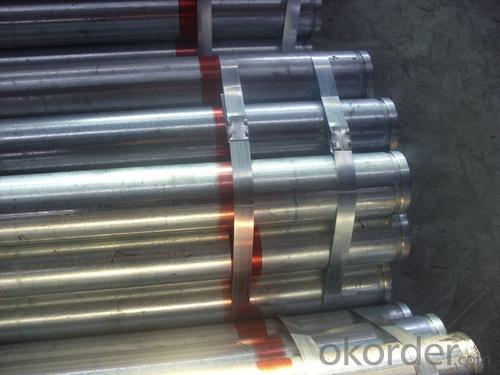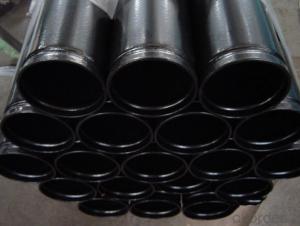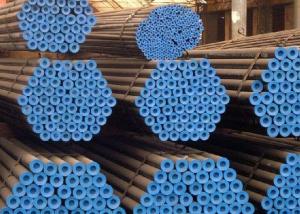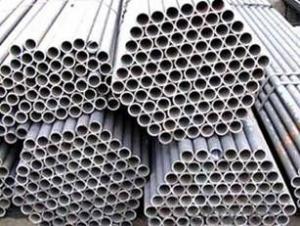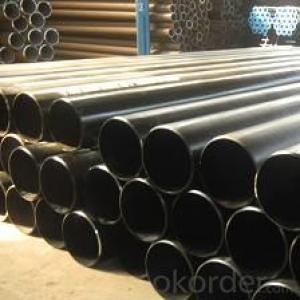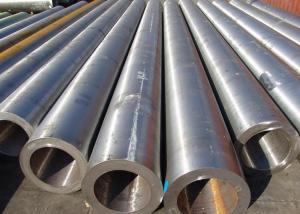seamless grooved pipe for fire fighting
- Loading Port:
- China Main Port
- Payment Terms:
- TT OR LC
- Min Order Qty:
- -
- Supply Capability:
- -
OKorder Service Pledge
OKorder Financial Service
You Might Also Like
Our company is specialized in the supply of Hot Dipped Galvanized Pipes. We supply stee pipesl with very competitive price to meet customers' needs with the satisfied service and high standard quality.
Name | galvanized pipe with the standard quality |
Material | Q195, Q215, Q235, Q345, STK500 |
Specification | O.D.: 20- 273.1MM W.T.: 0.8 - 5mm |
Length | 5.8m, 6m, 11.8m or 12m, or per the buyers demand |
Surface treatment | Oil-dip, Varnish, Passivation, Phosphating, Shot Blasting. |
Certificates | BS1387-1985, DIN2440/2441, JIS-G3444 and ASTM |
Manufacture Technique | Seamless |
Section Shape | Round |
End | A): GTC (galvanized threaded and coupling) |
Weight | Billing on the basis of theoretical weight |
Packaging Details | Export packing or negotiation |
Trade Terms | FOB/CFR/CIF |
Payment Terms | L/C T/T |
Usage | Petroleum casing pipe/etroleum cracking pipe/gas cylinder tubes/highpressure boiler tubes/ high pressure chemical fertilizer pipe, ship tube |
Delivery Time | 7-30 days OR upon the negotation |
Minimum Order Quantity | 20/50/100 MT |
Supply Ability | 1000 Ton/Month |
Inspection | Chemical Composition Inspection, Mechanical Properties Test(Tensile Strength,Yield Strength, Elongation, Flaring, Flattening, Bending, Hardness, Impact Test), Surface and Dimension Test,No-destructive Test, Hydrostatic Test. |
- Q: How do you determine the weight per foot of a steel pipe?
- To determine the weight per foot of a steel pipe, you need to consider two main factors: the thickness and the diameter of the pipe. First, you need to measure the outer diameter (OD) and the wall thickness (WT) of the pipe using a caliper or a measuring tape. Once you have these measurements, you can calculate the inner diameter (ID) by subtracting twice the wall thickness from the outer diameter (ID = OD - 2 * WT). Next, use the formula for the cross-sectional area of a pipe (A = π * (OD^2 - ID^2) / 4) to calculate the cross-sectional area. Finally, multiply the cross-sectional area by the density of the steel, which is typically around 490 pounds per cubic foot, to determine the weight per foot of the steel pipe. Weight per foot (WPF) = A * 490 It's important to note that this calculation provides an estimate of the weight per foot, as manufacturing tolerances and slight variations in the density of the steel may affect the actual weight. Therefore, it is recommended to use this calculation as a guide and consult the manufacturer's specifications for more precise information.
- Q: How are steel pipes threaded?
- Steel pipes are typically threaded using a threading machine or a hand-held die. The process involves cutting grooves on the outer surface of the pipe to create a spiral pattern, allowing the pipe to be easily connected to fittings or other pipes.
- Q: How are steel pipes used in hydroelectric power plants?
- Steel pipes are used in hydroelectric power plants to facilitate the transportation of water from the reservoir to the turbines. These pipes are essential for maintaining a steady flow of water, which is crucial for generating electricity through the rotation of turbines. Additionally, steel pipes are employed in the construction of penstocks, which are large pipes directing water towards the turbines, ensuring efficient energy production in hydroelectric power plants.
- Q: Is hot dipped plastic pipe steel?
- The characteristics of hot dipped plastic pipe are:1., hot dipped plastic pipe superior anti-static performance: through the formula to add antistatic agent, so that its internal and external surface resistance value reached and exceeded the national industry standards.2., such as the use of plastic raw materials, add flame retardants. The flame retardant performance index conforms to the national standard, and the steel plastic composite structure has better flame retardance than the pure plastic pipe material, and is suitable for underground inflammable, explosive and other places.3. hot dip coating steel strong adhesion: steel surface after special treatment, curing, coating adhesion is greater than or equal to 30N/10mm.4., dense internal and external resin layer: coating thickness of more than 0.5 mm, no pinholes, with excellent corrosion resistance.The mechanical properties of plastic steel pipe superior 5. hot dip: can withstand the harsh conditions of use: coating steel has good toughness, high mechanical strength, impact bending and other foreign influence, has a strong bearing capacity, has better performance than other mine plastic pipes.6. hot dip steel corrosion and fouling, the fluid resistance is small: corrosion and fouling, especially suitable for the underground conveying high sulfur water and transport of calcium and magnesium plasma water, save the maintenance cost, service life is much higher than that of the other pipe, high economic benefit.7. self lubrication: smooth wall, no fouling, small transmission resistance, under the same conditions, can improve the transport capacity of 30%.8. convenient and reliable connectionThe utility model completely overcomes the defects of the difficult connection of the pure plastic mining materials, and can be connected with the underground steel pipe and the valve by using flanges, fast couplings, etc., and has strong interchangeability.
- Q: What are the advantages of using steel pipes in industrial plants?
- There are several advantages of using steel pipes in industrial plants. Firstly, steel pipes are known for their exceptional strength and durability. They can withstand high temperatures, pressure, and heavy loads, making them ideal for transporting various materials and fluids within industrial facilities. Secondly, steel pipes have excellent resistance to corrosion. This is particularly important in industrial settings where the pipes come into contact with corrosive substances or are exposed to harsh environmental conditions. The corrosion resistance of steel pipes ensures their longevity and helps to prevent leaks, which can be costly and hazardous. Additionally, steel pipes offer a high level of versatility. They can be easily fabricated and customized to meet specific requirements, such as different sizes and shapes. This flexibility allows for easier installation and maintenance, reducing downtime and improving overall efficiency in industrial plants. Moreover, steel pipes have a smooth interior surface, which offers several advantages. It allows for efficient flow of materials, minimizing resistance and pressure drop. This smoothness also makes steel pipes less prone to accumulating deposits and contaminants, ensuring a clean and hygienic environment. Furthermore, steel pipes are highly resistant to fire. In industrial plants, where fires can have catastrophic consequences, the fire resistance of steel pipes provides an added layer of safety. Lastly, steel pipes are cost-effective in the long run. Although their initial installation cost may be higher compared to other materials, such as plastic or copper, their durability and low maintenance requirements result in significant cost savings over time. Steel pipes have a long lifespan, reducing the need for frequent replacements or repairs, and their resistance to corrosion and other damages also contributes to cost reduction. In conclusion, the advantages of using steel pipes in industrial plants include their strength, durability, corrosion resistance, versatility, efficient flow, fire resistance, and cost-effectiveness. These qualities make steel pipes a reliable and efficient choice for various applications within industrial facilities.
- Q: What are the different methods of insulation for steel pipes?
- There are several methods of insulation for steel pipes, including foam insulation, fiberglass insulation, mineral wool insulation, and polyurethane insulation. These methods help to prevent heat loss or gain, protect against corrosion, and reduce condensation on the pipes.
- Q: Are steel pipes suitable for use in pharmaceutical industries?
- Yes, steel pipes are suitable for use in pharmaceutical industries. Steel pipes are known for their durability, strength, and resistance to corrosion. These qualities make them ideal for transporting chemicals, gases, and liquids safely and efficiently within pharmaceutical facilities. Additionally, steel pipes can be easily cleaned and sanitized, ensuring the maintenance of high hygienic standards required in the pharmaceutical industry.
- Q: Are steel pipes suitable for transporting fluids?
- Yes, steel pipes are highly suitable for transporting fluids due to their durability, strength, and resistance to corrosion. They can safely and efficiently transport a wide range of fluids, including water, oil, gas, and chemicals, making them a popular choice in various industries such as oil and gas, water supply, and construction.
- Q: What are the different types of coatings used for internal lining of steel pipes?
- There are several types of coatings commonly used for the internal lining of steel pipes, including epoxy coatings, polyurethane coatings, cement mortar linings, and polyethylene linings. Each type of coating offers different benefits and is chosen based on factors such as the intended application, corrosion resistance requirements, and cost-effectiveness.
- Q: Are steel pipes suitable for underground irrigation systems?
- Yes, steel pipes can be suitable for underground irrigation systems. Steel pipes are known for their durability and strength, making them resistant to corrosion and able to withstand high pressure. They are also less likely to crack or break under the ground's weight or pressure. Additionally, steel pipes have a long lifespan, reducing the need for frequent replacements. However, it is important to consider the type of water being transported, as certain minerals or chemicals in the water can cause corrosion over time. In such cases, it may be necessary to use corrosion-resistant coatings or liners. Overall, steel pipes are a reliable choice for underground irrigation systems, especially in areas with high water pressure or where durability is a priority.
Send your message to us
seamless grooved pipe for fire fighting
- Loading Port:
- China Main Port
- Payment Terms:
- TT OR LC
- Min Order Qty:
- -
- Supply Capability:
- -
OKorder Service Pledge
OKorder Financial Service
Similar products
Hot products
Hot Searches
Related keywords
